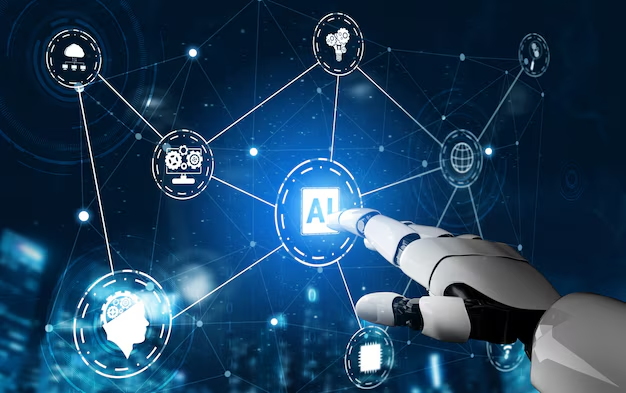Artificial Intelligence (AI) automation is revolutionizing how businesses and organizations process data and make decisions. By leveraging AI-driven technologies, companies can streamline workflows, improve accuracy, and make data-driven decisions faster than ever before. This article explores the impact of AI automation on data processing and decision-making across various industries.
1. Understanding AI Automation in Data Processing

Data processing involves collecting, analyzing, and interpreting vast amounts of information. Traditional methods often require significant human intervention, leading to errors, inefficiencies, and delays. AI automation enhances data processing by:
- Automating Data Collection: AI tools extract data from various sources, including databases, web scraping, and IoT devices.
- Data Cleansing and Preprocessing: AI algorithms detect errors, remove duplicates, and standardize formats for better analysis.
- Real-Time Data Analysis: AI processes and analyzes data instantly, allowing businesses to act on insights promptly.
- Pattern Recognition: Machine learning models identify trends, correlations, and anomalies in data.
2. AI-Driven Decision Making
AI-driven decision-making eliminates guesswork by leveraging data analytics, predictive modeling, and machine learning algorithms. Key applications include:
A. Business Intelligence and Strategy
- AI analyzes historical sales data to forecast market trends and customer preferences.
- Automated decision-making tools recommend pricing strategies and inventory management solutions.
- AI-powered dashboards provide real-time insights for executives and stakeholders.
B. Financial and Risk Management
- AI detects fraudulent transactions by analyzing spending patterns.
- Risk assessment models evaluate creditworthiness for loan approvals.
- AI-powered trading algorithms optimize investment decisions.
C. Healthcare and Medical Diagnosis
- AI assists in diagnosing diseases through image recognition and predictive analytics.
- Automated systems recommend personalized treatment plans based on patient data.
- AI analyzes medical research to assist doctors in decision-making.
D. Customer Experience and Personalization
- AI chatbots provide real-time assistance, reducing customer service response times.
- Machine learning recommends personalized content, products, and services.
- Sentiment analysis helps businesses understand customer feedback and improve services.
E. Supply Chain and Logistics Optimization
- AI predicts demand fluctuations, optimizing inventory levels and reducing waste.
- Automated route planning minimizes delivery times and fuel consumption.
- AI-powered robots streamline warehouse operations and logistics management.
3. Advantages of AI Automation in Data Processing and Decision Making

The integration of AI automation offers several benefits, including:
- Speed and Efficiency: AI processes vast amounts of data faster than humans.
- Improved Accuracy: AI minimizes human errors, enhancing data quality and reliability.
- Cost Reduction: Automation reduces labor costs and operational expenses.
- Scalability: AI systems handle growing data volumes without compromising performance.
- Better Decision Making: AI-driven insights enable proactive and strategic decision-making.
4. Challenges and Ethical Considerations
Despite its advantages, AI automation presents challenges that must be addressed:
- Data Privacy Concerns: AI systems require large datasets, raising privacy and security issues.
- Bias in AI Models: Machine learning models may inherit biases from training data, leading to unfair decisions.
- Dependence on AI: Over-reliance on automation can limit human oversight and creativity.
- Regulatory Compliance: Governments and industries must establish AI governance frameworks.
5. The Future of AI in Data Processing and Decision Making

AI automation will continue to evolve, leading to:
- Explainable AI (XAI): Enhancing AI transparency and accountability in decision-making.
- AI-Augmented Workforce: AI tools assisting humans rather than replacing them.
- Quantum Computing in AI: Accelerating data processing capabilities for complex decision-making.
- Advanced Predictive Analytics: AI-driven insights improving forecasting and risk assessment.
Also Read : AI In Cybersecurity: How Artificial Intelligence Is Defending Against Cyber Threats
Conclusion
AI automation is transforming data processing and decision-making by enhancing efficiency, accuracy, and scalability. While challenges such as data privacy and AI bias remain, businesses and organizations must embrace AI responsibly to harness its full potential. As technology advances, AI will continue to shape the future of decision-making across industries.
FAQs
1. What is AI automation in data processing?
AI automation in data processing refers to the use of artificial intelligence to collect, analyze, and interpret data with minimal human intervention.
2. How does AI improve decision-making?
AI improves decision-making by analyzing large datasets, identifying patterns, and providing data-driven insights to support strategic choices.
3. What industries benefit from AI-driven decision-making?
Industries such as finance, healthcare, retail, manufacturing, and logistics benefit significantly from AI-powered decision-making tools.
4. What are the challenges of AI in data processing?
Challenges include data privacy concerns, bias in AI models, regulatory compliance, and dependence on automation.
5. What is the future of AI in automation?
The future of AI automation includes advancements in explainable AI, AI-augmented workforces, quantum computing, and predictive analytics.

